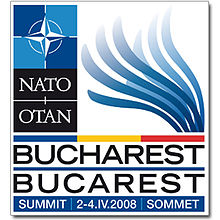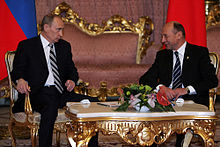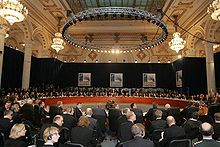- 2008 Bucharest summit
-
Bucharest summit 
Bucharest summit logoSummit details Host country Dates April 2–4, 2008 The 2008 Bucharest Summit or the 20th NATO Summit was a NATO summit organized in Bucharest, Romania on 2 – 4 April 2008.[1][2] Among other business, Croatia and Albania were invited to join the alliance. Republic of Macedonia was not invited due to its ongoing naming dispute with Greece. Georgia and Ukraine had hoped to join the NATO Membership Action Plan,[3] but the NATO members decided to review their request in December 2008.[4]
The fear that NATO is evolving into a worldwide coalition of the willing, as such increasing polarisation and militarization in international affairs, sparked protests at NATO's HQ in Brussels two weeks before the summit,[5] and in Bucharest.[6] Protesters targeted the renewed determination of NATO to use nuclear weapons[7][8] and NATO's backing of the US anti-missile shield.[9]
Contents
Summit agenda
As said by Craig Kennedy in an introduction to the NATO Bucharest summit[10] and from the NATO summit program.[11]
- NATO's capability and capacity.
- The tensions in the Russia-NATO relationship (3 and 4 April).
- Cyber security.
- EU-NATO partnership.
- Energy security.
- Stability of the Western Balkans.
- The mission in Afghanistan (2 and 3 April).
- NATO enlargement (Albania, Croatia, Macedonia).
- NATO Action Plan membership (Georgia and Ukraine) (4 April).
- Moldova's future in NATO.
Host
Romania competed for the organization of this summit with Portugal, which initially was scheduled to host the summit in 2006, but eventually conceded in favor of Latvia, which held the 2006 Riga Summit.[2] Romania received support from the United States, and U.S. Under Secretary of State R. Nicholas Burns said in December 2006 that Romania deserved the honor to hold this event due to its contribution to the Alliance's common effort in the War in Afghanistan and for stability in the Iraq War. Romania has been a member of NATO since March 14, 2004.
Non-invitation
Main article: Macedonia naming disputeAn invitation to join the Alliance was not extended to the Republic of Macedonia. Greece had threatened on several occasions to veto the country's NATO bid due to the longstanding naming dispute over the latter's name.[12] The last UN proposal before the summit was the name "Republic of Macedonia (Skopje)", which was rejected by Greece.[13] Athens argues that use of the name "Macedonia" implies territorial claims on its own region of Macedonia.[9] Skopje denies this,[14] citing constitutional amendments that specifically exclude "territorial pretensions".[15][16] NATO officials said the country could begin talks on joining the alliance as soon as it had resolved its dispute with Greece.[17]
While under the terms of the Interim Accord, signed between the two parties in 1995, Athens agreed not to block "membership in international, multilateral and regional organizations and institutions" under the FYROM acronym,[18] Greece expected that the country would immediately request recognition by its constitutional name once it gained entry into the organization.[19] According to politicians in Skopje, Athens has directly breached the Interim Accord.[20]
The governments that supported its membership bid argued that the country had completed the necessary reforms for membership, and that regional stability would be challenged if it did not join NATO.[21][22] Conversely, Athens contends that although Skopje rejects territorial claims officially, in practice there have been numerous irredentist provocations by high government officials, schoolbooks, and other governmental publications.[23][24] Senior officials in Skopje asserted that the country had fulfilled NATO requirements to join and was being "punished" for its identity.[25]
NATO-Russia meeting
 Romanian President Traian Băsescu and Russian President Vladimir Putin, before NATO summit, in Bucharest, on 4 April 2008.
Romanian President Traian Băsescu and Russian President Vladimir Putin, before NATO summit, in Bucharest, on 4 April 2008.
Russian President Vladimir Putin was invited to the summit, and he arrived on the second day (3 April) to participate in bilateral NATO-Russia talks. He opposed the US plans to deploy missile defenses in Poland and the Czech Republic, which was discussed at the summit. Russia also opposed Georgia and Ukraine's NATO membership bids.[26]
Outcome
Summary of 2 April
- German Minister of Foreign affairs Frank-Walter Steinmeier talked about Ukraine and Georgia and tried not to provoke Russia by doing so, as they are both on Russia's borders and are both former Soviet states.[27] Romanian President Traian Băsescu said Romania's approach to the relationship with Russia was to "leave behind the Cold War logic."[28]
- U.S. President George W. Bush had a meeting at Neptun with President Băsescu about visas for one another's countries and working on organising bilateral relationships. President Băsescu claimed Romania deserved to have better relations with the US as it had sent troops to Iraq and Afghanistan[29] and had worked with the US.[30][31]
- NATO Secretary General Jaap de Hoop Scheffer opened the 'Securing our future' expedition. The display 'Defence against terrorism' was launched in the same exhibition and there were talks about NATO's involvement in Iraq and Afghanistan and making it a success.[32]
- President Bush strongly supported Ukraine and Georgia becoming NATO action plan members; however, he was opposed by the United Kingdom, France and Germany. The British judgment is that, although there was full support for both Ukraine and Georgia, the question of when they joined should remain in the balance. Angela Merkel, the German Chancellor, and President Nicolas Sarkozy of France are of the same mind.[33]
- President Bush said he is "satisfied with the NATO commitment to Afghanistan". Countries such as France and Romania promised to send more troops to support the NATO mission in Afghanistan.[34]
- Jaap de Hoop Scheffer and Danish Prime Minister Anders Fogh Rasmussen launched a new web-based television channel meant to improve understanding of the Alliance roles, operation and missions at the NATO Summit in Bucharest.[35][36]
Summary of 3 April
- A consensus was reached on Croatia and Albania. They were invited to join the alliance in 2009.[37][38]
- Republic of Macedonia's NATO bid has not been accepted yet due to the name dispute with Greece. However Jaap de Hoop Scheffer said that the invitation will be offered to Skopje authorities "as soon as possible, as soon as a solution will be found".[39] Macedonian officials expressed their disappointment and argued that the decision would undermine stability in the Balkans.[4] All NATO members agreed in writing that the Former Yugoslav Republic of Macedonia will not be able to join the alliance until it has settled its dispute with Greece.[40]
- The alliance did not offer a Membership Action Plan to Georgia or Ukraine, largely due to the opposition of Germany and France, but pledged to review the decision in December 2008.[4] Even though Georgia was not offered MAP, it welcomed the decision and said "The decision to accept that we are going forward to an adhesion to NATO was taken and we consider this is a historic success".[41]
- Nicolas Sarkozy, the French President, has confirmed he will send a battalion of troops (around 800) to the East of Afghanistan,[42] in order to ensure Canada could remain in the Kandahar province. Prime Minister Stephen Harper was threatening to remove Canada from the combat mission if another 1000 troops were not sent as reinforcements.
- President Sarkozy also said that France could be reintegrated the NATO military command at the next Alliance Summit in 2009, after it left the NATO military command in 1966.
- Bosnia and Herzegovina and Montenegro started the NATO intense dialogue phase[43] and the alliance is thinking of co-operating with Serbia too.[44]
- Vladimir Putin, the President of the Russian Federation, arrived in Bucharest to participate in Friday's NATO-Russia Council session. President Putin will present to the members of the Alliance Moscow’s point of view regarding the future collaboration in the Council, and the challenges that the contemporary world faces.[45] President Putin attended the summit with a positive attitude and wanted to avoid the disputes relating to recognition of the Kosovo province or the missile shield, and the speech of the Russian President was expected to be moderate.[46]
- NATO announced its support for the territorial integrity, independence and sovereignty of Armenia, Azerbaijan, Georgia and Moldova.[47][48]
- Malta re-joined the NATO Partnership for Peace after leaving it once before in October 1996.[49]
Summary of 4 April
- President Vladimir Putin invited Romanian President Băsescu at dinner to visit Russia. The two leaders agreed upon a bilateral meeting. During the dinner, President Putin had a range of meetings with the US President George W. Bush with whom he discussed about the meeting in Sochi set for April 6, with German Chancellor Angela Merkel, with UN Secretary General Ban Ki-moon, who is expected in Russia on April 9, and with President of the European Commission, José Manuel Durão Barroso.[46]
- Russia signed an agreement with NATO permitting transit across Russia of non-military equipment, food products, fuel and transport vehicles to forces in Afghanistan.[50]
- NATO and Russia disagreed over Kosovo and no consensus was reached. Jaap de Hoop Scheffer said that ”The debate on Kosovo should continue because we had a round of different opinions”.[51]
After the summit
- Poland claimed it was satisfied with the NATO summit. The Polish delegation at the NATO summit in Bucharest is satisfied with the Organisation’s declaration supporting the deployment of the US antimissile shield in Europe, Sławomir Nowak, the head of PM’s political cabinet, has said.[52]
- Russian President Putin was pleased about the alliance deciding not to invite Georgia and Ukraine to the Membership Action Plan at least for the time being.[53]
- NATO Spokesman, James Appathurai, has spoken about the positives results of the high level reunion concerning the Alliance enlargement and NATO missile defence, which will be complementary of the American one. He was pleased about Albania and Croatia. He also said that Republic of Macedonia is still at the "alliance's door" and will be invited to join NATO as soon as the naming dispute is resolved.[54]
References
- ^ Bucharest to host 2008 NATO Summit, NATO, April 27, 2007,
- ^ a b Romania to host NATO summit in spring 2008, Romanian Information Center in Brussels, 2007
- ^ NATO Summit Bucharest 2008
- ^ a b c Nato denies Georgia and Ukraine. The BBC News. 3 April 2008.
- ^ "Arrests at Belgian Nato protest". BBC News. 2008-03-22. http://news.bbc.co.uk/2/hi/europe/7310077.stm. and "Over 100 anti-war protesters arrested at NATO HQ". Reuters. 2008-03-22. http://www.reuters.com/article/topNews/idUSL2248398820080322?pageNumber=1&virtualBrandChannel=0.
- ^ "Romanian police question 46 anti-NATO demonstrators after scuffle". International Herald Tribune. 2008-04-02. http://www.iht.com/articles/ap/2008/04/02/europe/EU-GEN-NATO-Summit-Protests.php.
- ^ Traynor, Ian (22 January 2008). "Pre-emptive nuclear strike a key option, Nato told". The Guardian (London). http://www.guardian.co.uk/nato/story/0,,2244782,00.html. Retrieved 2008-01-23.
- ^ "Nato 'must prepare to launch nuclear attack'". Telegraph (London). 23 January 2008. http://www.telegraph.co.uk/news/main.jhtml?xml=/news/2008/01/22/wnato122.xml. Retrieved 2008-01-23.
- ^ a b "Nato to back US missile defence". BBC News. 2008-04-03. http://news.bbc.co.uk/2/hi/europe/7328915.stm.
- ^ NATO Summit Bucharest 2008
- ^ NATO Summit Bucharest 2008
- ^ Trend News : Greece to veto Macedonia membership at NATO summit
- ^ Greece dissatisfied with UN proposal on Macedonia name dispute[dead link]
- ^ Macedonia Leaves NATO Summit Early in Protest Over Membership Delay
- ^ Macedonia: New Developments In Name Row With Greece - RADIO FREE EUROPE / RADIO LIBERTY
- ^ Constitution of the Republic of Macedonia
- ^ "The NATO summit – With allies like these – Economist.com". The Economist. http://www.economist.com/world/international/displaystory.cfm?story_id=10981434.
- ^ Macedonia FAQ: Interim Accord between the Hellenic Republic and the Republic of Macedonia
- ^ George Delastik, The End of the Balkans, 2008, p.p.85-100
- ^ EXTRA: Macedonians walk out of NATO summit over Greek rejection : Europe World
- ^ Lungescu, Oana (2008-04-04). "Nato Macedonia veto stokes tension". BBC News. http://news.bbc.co.uk/2/hi/europe/7329963.stm. Retrieved 2010-04-22.
- ^ Macedonian delegation to stage protest walkout after NATO membership bid delayed - International Herald Tribune
- ^ Interview of FM Ms. Bakoyannis in Frankfurter Allgemeine Zeitung, with journalist Michael Martens
- ^ Bakoyannis, Dora (April 1, 2008). "All in a Name". The Wall Street Journal. http://online.wsj.com/article/SB120701620662579369.html.
- ^ Makfax vesnik[dead link]
- ^ http://news.yahoo.com/s/ap/20080331/ap_on_re_eu/russia_vs_nato_1
- ^ NATO Summit Bucharest 2008
- ^ NATO Summit Bucharest 2008
- ^ NATO Summit Bucharest 2008
- ^ NATO Summit Bucharest 2008
- ^ NATO Summit Bucharest 2008
- ^ NATO Summit Bucharest 2008
- ^ Michael Evans and Francis Elliott (2008-04-03). "Nato summit: George Bush abandoned over Ukraine and Georgia". London: The Times. http://www.timesonline.co.uk/tol/news/world/europe/article3670335.ece?token=null&offset=0. Retrieved 2008-04-07.
- ^ NATO Summit Bucharest 2008
- ^ NATO news: NATO launches new TV channel - 28 March 2008
- ^ natochannel.tv
- ^ "Bucharest Summit Declaration Issued by the Heads of State and Government participating in the meeting of the North Atlantic Council in Bucharest on 3 April 2008". NATO. 2008-04-03. http://www.summitbucharest.ro/en/doc_202.html. Retrieved 2008-04-06.
- ^ NATO chief welcomes Albania and Croatia for 2009. RadioNetherlands. April 3, 2008.[dead link]
- ^ NATO Summit Bucharest 2008
- ^ ekathimerini.com | Greece blocks FYROM but still wants to talk. eKathimerini.com. April 4, 2008.
- ^ NATO Summit Bucharest 2008
- ^ NATO Summit Bucharest 2008
- ^ NATO invites Montenegro, Bosnia-Herzegovina to intensify dialogue_English_Xinhua
- ^ NATO Summit Bucharest 2008
- ^ NATO Summit Bucharest 2008
- ^ a b NATO Summit Bucharest 2008
- ^ NATO Summit Bucharest 2008
- ^ Moldpres News Agency[dead link]
- ^ NATO news:Malta re-engages in the Partnership for Peace Programme - 3 April 2008
- ^ NATO Summit Bucharest 2008
- ^ BalkanInsight.com - NATO, Russia Disagree on Kosovo[dead link]
- ^ The News | News
- ^ Evans, Michael (April 5, 2008). "Vladimir Putin tells summit he wants security and friendship". The Times (London). http://www.timesonline.co.uk/tol/news/world/article3681609.ece.
- ^ NATO Summit Bucharest 2008
External links
- Official Website
- Bucharest Summit Declaration Issued by the Heads of State and Government participating in the meeting of the North Atlantic Council in Bucharest on 3 April 2008
- ISAF's Strategic Vision Declaration by the Heads of State and Government of the Nations contributing to the UN-mandated NATO-led International Security Assistance Force (ISAF) in Afghanistan
- 2008 Vilnius NATO meeting
- FYR of Macedonia after Bucharest: avoiding another European failure in the Balkans, Opinion by Aleksandar Matovski, June 2008, European Union Institute for Security Studies
NATO summits 1950s 1957 1st NATO summit Paris
1970s 1974 2nd NATO summit Brussels · 1975 3rd NATO summit Brussels · 1977 4th NATO summit London · 1978 5th NATO summit Washington, D.C.
1980s 1990s 1990 11th NATO summit London · 1991 12th NATO summit Rome · 1994 13th NATO summit Brussels · 1997 14th NATO summit Paris · 1997 15th NATO summit Madrid · 1999 16th NATO summit Washington, D.C.
2000s 2002 17th NATO summit Rome · 2002 18th NATO summit Prague · 2004 19th NATO summit Istanbul · 2005 20th NATO summit Brussels · 2006 21st NATO summit Riga · 2008 22nd NATO summit Bucharest · 2009 23rd NATO summit Strasbourg-Kehl
2010s Special 2001 NATO HQ summit Brussels
Categories:- History of Bucharest
- NATO summits
- 2008 in Romania
- 2008 in politics
- Diplomatic conferences in Romania
- 21st-century diplomatic conferences
- 2008 in international relations
- 2008 conferences
Wikimedia Foundation. 2010.

